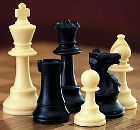

 |
 |
| Home | Contact | Clubs | Team competitions | Current season | Games | Cornwall Rating List | Information | County team | Archive | Links |
| Henry Adamson (1871 - 1941) |
|
Last year I wrote a brief history of Plymouth Chess Clubís annual championship competition for our website. The club was founded in 1888 and I thought it would be good to document what we know about past championship formats, trophies and winners. Over the years forty individuals had won the coveted title of club champion. Having previously put together a short history of the club, most of the past champions I had some knowledge of. However in the list of past champions there were a few names I hadnít previously come across and to be honest, I did not pay too much attention to them. I assumed they were decent club players who were fortunate to have a good run in the championship in one or two seasons but otherwise had made no impact beyond club level. One of those names was two time winner (1897 and 1898) H A Adamson. After some internet searching I found a special edition of British Endgame Study News from 1996 dedicated to ĎThe Studies of H. A. Adamsoní (pdf version). This had the following information: Henry Anthony Adamson was born in Ealing, London, in 1871, but he spent most of his later life in Falmouth. He died in 1941, and an obituary by T. R. Dawson appears on page 275 of that year's BCM. Dawson describes him as "a powerful mathematician, third wrangler of his year [third in the mathematical graduation list at Cambridge], and a brilliant chess problem analyst." Most of his composition was in the field of fairy chess, where Dawson rated him very highly indeed. He played on top board for Cornwall, and as an endgame analyst he was correspondingly strong if not quite in the class of Grigoriev. With further research I found that after his time in Plymouth, Adamson became a mathematics teacher at Sherborne School, Dorset where he taught from 1901 to 1908. In 1909 he married but his wife sadly died from tuberculosis in 1912. By then they were settled in Falmouth and in his new home county of Cornwall he won the county championship in 1912, 1913 and 1914. In 1898 he beat Emmanuel Lasker in a simultaneous display organised by the club four years after Lasker had become World Champion. The game can be found here. According to comments posted on chessgames.com there are two versions of the results for this simul, both of which we can assume are correct. One comment says a report in the Devon and Exeter Gazette gave the score at closing time as +21 -1 (Lasker vs H A Adamson) with 9 games to be adjudicated. Another comment states the final results were: +24=4-3. On that website, in addition to the Adamson game there are three other games from the event. A win over 15 times Plymouth club champion Thomas Taylor, a draw against 4 times club champion C F Cooper and a loss to D W Earle Ė the last two presumably adjudicated. All four games were under 30 moves and play in the Cooper and Earle games stopped at move 25. For much of his career Lasker used Exhibition matches (as simuls were referred to) to support himself. Presumably he took a very pragmatic approach and made his excuses and left as soon as he had beaten the majority of his opponents. I donít have any record of DW Earle being a Plymouth club member but itís highly likely he was. Using the power of Google I was able to find one more reference to him, drawing against H E Bird in a simul in Plymouth in 1890. So he must have been quite a useful player and I think we can claim him as one of ours. The 27 year period Lasker was World Champion was not a golden age for chess but nevertheless holding the title for so long was a great achievement. If Magnus Carlsen wants to beat this he will need to retain his title for another 21 years by which time he will be 50! |
|
A pdf copy of the full article is here |